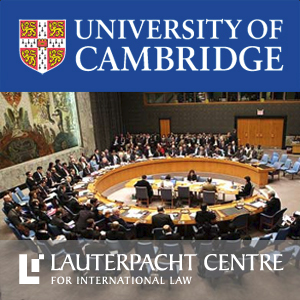Hersch Lauterpacht Memorial Lecture 2016: "International Law and Women, Peace and Security", by Professor Christine Chinkin. Part 1: "What is the Women, Peace and Security Agenda Under International Law?"
Duration: 52 mins 8 secs
Share this media item:
Embed this media item:
Embed this media item:
About this item

| Description: |
The Hersch Lauterpacht Memorial Lecture is an annual lecture series given in Cambridge to commemorate the unique contribution to the development of international law of Sir Hersch Lauterpacht. These lectures are given annually by a person of eminence in the field of international law and a revised and expanded version of the lectures is usually published in the Hersch Lauterpacht Lecture Series by Cambridge University Press. The lecture comprises three parts, delivered on consecutive evenings, followed by a Q&A session on the fourth day.
The 2016 Hersch Lauterpacht Memorial Lecture series, entitled 'International Law and Women, Peace and Security' was delivered at the Lauterpacht Centre for International Law, University of Cambridge, by Professor Christine Chinkin, Emerita Professor in International Law and Director of the Centre for Women Peace and Security at the London School of Economics, from Tuesday 25 to Friday 28 October 2016. This part, entitled 'What is the Women, Peace and Security Agenda Under International Law?' is the first of the three lectures given. |
|---|
| Created: | 2016-11-07 12:03 |
|---|---|
| Collection: | LCIL International Law Seminar Series MOVED |
| Publisher: | University of Cambridge |
| Copyright: | University of Cambridge |
| Language: | eng (English) |
| Keywords: | International Law; Human Rights Law; Public International Law; United Nations; Gender-Based Violence; War; Peacebuilding; Equality; |
| Abstract: | Part 1: What is the Women, Peace and Security Agenda Under International Law?
In this first lecture I will introduce what is now known as the Security Council’s Women, Peace and Security agenda following the Council’s adoption of Resolution 1325 in October 2000, including its evolution and contemporary substantive content. I will reflect upon the fact that it has become part of the international landscape and discuss its status under international law, in particular whether it can be understood as constituting a special regime of international law. |
|---|---|

